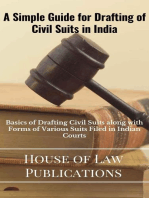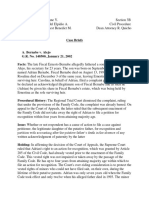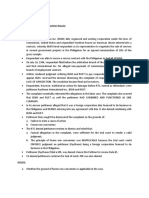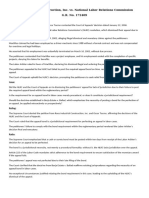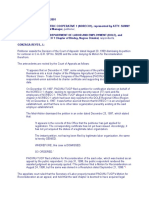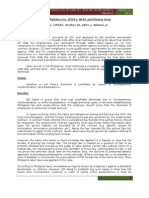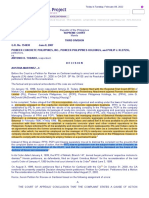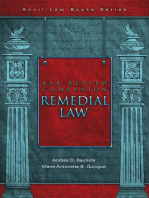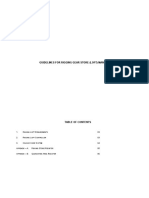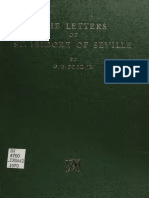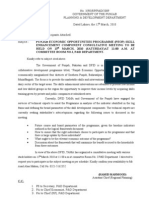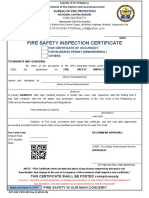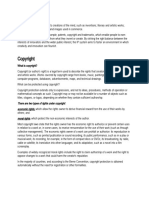Cadalin v. POEA
Cadalin v. POEA
Uploaded by
russell.piqueroCopyright:
Available Formats
Cadalin v. POEA
Cadalin v. POEA
Uploaded by
russell.piqueroCopyright
Available Formats
Share this document
Did you find this document useful?
Is this content inappropriate?
Copyright:
Available Formats
Cadalin v. POEA
Cadalin v. POEA
Uploaded by
russell.piqueroCopyright:
Available Formats
Facts:
The case "Cadalin v. Administrator, Philippine Overseas Employment Administration" involves a
class suit initiated by Bienvenido M. Cadalin, Rolando M. Amul, Donato B. Evangelista, and 1,767
other overseas contract workers (OCWs).
The suit was filed against Asia International Builders Corporation (AIBC) and Brown & Root
International Inc. (BRII) on June 6, 1984, with the Philippine Overseas Employment
Administration (POEA).
The claimants sought compensation for the unexpired portion of their employment contracts,
interest on unpaid benefits, area wage and salary differential pay, fringe benefits, and other
monetary claims.
Initially, the POEA awarded monetary benefits to only 149 claimants and dismissed certain
claims due to a lack of substantial evidence or proof of employment.
The case was appealed to the National Labor Relations Commission (NLRC), which modified the
POEA's decision and directed further hearings for some claims.
The case was eventually elevated to the Supreme Court, leading to the consolidation of multiple
petitions filed by both the claimants and the respondents.
Facts 2:
Cadalin et al. are Filipino workers recruited by Asia Int’l Builders Co. (AIBC), a domestic
recruitment corporation, for employment in Bahrain to work for Brown & Root Int’l Inc. (BRII)
which is a foreign corporation with headquarters in Texas. Plaintiff instituted a class suit with the
POEA for money claims arising from the unexpired portion of their employment contract which
was prematurely terminated. They worked in Bahrain for BRII and they filed the suit after 1 yr.
from the termination of their employment contract.
As provided by Art. 156 of the Amiri Decree aka as the Labor Law of the Private Sector of
Bahrain: “a claim arising out of a contract of employment shall not be actionable after the lapse
of 1 year from the date of the expiry of the contract,” it appears that their suit has prescribed.
Issue:
1. WON the foreign law should govern or the contract of the parties.(WON the complainants who
have worked in Bahrain are entitled to the above-mentioned benefits provided by Amiri Decree
No. 23 of Bahrain).
2. WON the Bahrain Law should apply in the case. (Assuming it is applicable WON complainants’
claim for the benefits provided therein have prescribed.)
3. Whether or not the instant cases qualify as; a class suit (siningit ko nalang)
(the rest of the issues in the full text of the case refer to Labor Law)
Ruling:
The Supreme Court dismissed all the petitions, thereby upholding the NLRC's decision.
The Court ruled that the prescriptive period for filing the claims is three years under the Labor
Code.
It determined that the labor cases do not qualify as a class suit.
The proceedings conducted by the POEA and the NLRC adhered to the requirements of due
process.
The Court found no grave abuse of discretion i...
Ratio:
The Court held that the prescriptive period for filing money claims arising from employer-
employee relations is three years under Article 291 of the Labor Code, rather than ten years
under Article 1144 of the Civil Code.
The claims stemmed from the employer-employee relationship, which is broader in scope than
claims arising from a specific law or contract.
The Court concurred with the NLRC that the labor cases do not qualify as a class suit
Case Background and Parties Involved
The case of Cadalin v. Administrator, Philippine Overseas Employment Administration involves a
class suit filed by overseas contract workers against Asia International Builders Corporation
(AIBC) and Brown and Root International Inc. (BRII) for money claims.
The case was filed by Bienvenido M. Cadalin, Rolando M. Amul, Donato B. Evangelista, and
1,767 other named complainants, represented by their attorney-in-fact, Atty. Gerardo A. Del
Mundo.
The claimants sought payment for the unexpired portion of their employment contracts, as well
as various other benefits and reimbursements.
Stages of Proceedings and Motions
The case went through several stages of proceedings, including motions, appeals, and petitions.
The claimants argued that AIBC and BRII had waived their right to present evidence and had
defaulted by failing to file their answers and attend the pre-trial conference.
AIBC and BRII appealed to the National Labor Relations Commission (NLRC), seeking the
reversal of the POEA's decision.
The NLRC modified the decision of the POEA, dismissing some claims and granting others.
The claimants and AIBC and BRII filed motions for reconsideration, which were denied by the
NLRC.
Compromise Agreements and Dismissal of Claims
Throughout the proceedings, the claimants and AIBC and BRII entered into several compromise
agreements, which were approved by the court.
These agreements resulted in the dismissal of the claims of certain claimants.
Key Issues Raised in the Case
The issues raised in the case included the entitlement of the claimants to benefits provided by
Amiri Decree No. 23 of Bahrain, the prescription of the claims, the classification of the case as a
class suit, the compliance with due process, the jurisdiction and liability of AIBC and BRII, and
the dismissal of certain claims.
NLRC Rulings on Key Issues
The NLRC ruled that the claimants were entitled to benefits provided by Amiri Decree No. 23 of
Bahrain, but only for those who worked in Bahrain.
The NLRC also held that the prescriptive period for the claims was three years.
The NLRC agreed with the POEA Administrator that the case could not be treated as a class suit
because not all the claimants worked in Bahrain.
The NLRC found that there were violations of due process in the proceedings and that AIBC and
BRII were solidarily liable for the claims.
The NLRC also held that jurisdiction over BRII was acquired through the summons served on
AIBC.
Court's Decision and Rulings on Petitions
The Court held that the right to a speedy disposition of cases is a relative term and that the
delay in the proceedings was not unreasonable or arbitrary.
The Court dismissed the claimantscontinue reading
You might also like
- Appeals DigestDocument26 pagesAppeals DigestAngelica Fojas RañolaNo ratings yet
- Simple Guide for Drafting of Civil Suits in IndiaFrom EverandSimple Guide for Drafting of Civil Suits in IndiaRating: 4.5 out of 5 stars4.5/5 (4)
- Civ Pro DigestDocument125 pagesCiv Pro DigestJM GuevarraNo ratings yet
- Introduction To Law NotesDocument10 pagesIntroduction To Law NotesAnne JariolNo ratings yet
- Bud Hibbs Americas CreditDocument245 pagesBud Hibbs Americas CreditPete Kob0% (1)
- Case Chapter 3 - Accounting IntermediateDocument2 pagesCase Chapter 3 - Accounting IntermediateIndra Aminudin100% (3)
- Kapisanan V BarreroDocument1 pageKapisanan V BarreroAnonymous Kj21YrhfNo ratings yet
- Facts:: Barrio Fiesta Restaurant V. Beronia, G.R No. 206690Document29 pagesFacts:: Barrio Fiesta Restaurant V. Beronia, G.R No. 206690Allana NacinoNo ratings yet
- Labor Relations Case DigestDocument7 pagesLabor Relations Case DigestMacy Tang100% (1)
- Greorg Grotjahn V Isnani FullDocument5 pagesGreorg Grotjahn V Isnani FullRejane MarasiganNo ratings yet
- Delfin Vs InciongDocument1 pageDelfin Vs InciongzzzNo ratings yet
- ATCI Overseas Corporation v. Echin, GR No. 178551, October 11, 2010Document5 pagesATCI Overseas Corporation v. Echin, GR No. 178551, October 11, 2010zafi nahNo ratings yet
- Magbanua Vs UyDocument5 pagesMagbanua Vs UyRon AceroNo ratings yet
- ATCI Overseas Corporation v. Echin20180918-5466-Q2lmtvDocument5 pagesATCI Overseas Corporation v. Echin20180918-5466-Q2lmtvPat CostalesNo ratings yet
- CADALIN VS POEA DigestedDocument1 pageCADALIN VS POEA Digestedapi-27247349100% (1)
- Conflict of Laws DigestDocument38 pagesConflict of Laws DigestBhell MendiolaNo ratings yet
- Significant Cases-Employment Law ReviewDocument4 pagesSignificant Cases-Employment Law ReviewRadhika RamachandranNo ratings yet
- LABOR 2 CASES On JurisdictionDocument9 pagesLABOR 2 CASES On JurisdictionSummerson MacasarteNo ratings yet
- Supreme CourtDocument6 pagesSupreme CourtAngelina Villaver ReojaNo ratings yet
- 069 Abosta Ship MGT V HilarioDocument7 pages069 Abosta Ship MGT V HilarioTeodoro Jose BrunoNo ratings yet
- Case Digest Nov 27Document11 pagesCase Digest Nov 27JanJan ClarosNo ratings yet
- Atci v. Echin G.R. No. 178551Document11 pagesAtci v. Echin G.R. No. 178551albemartNo ratings yet
- Raytheon Internation Inc. vs. Stockton RouzieDocument2 pagesRaytheon Internation Inc. vs. Stockton RouzieAnonymous ka1hlHuNo ratings yet
- Hacienda Fatima vs. National Federation of Sugarcane Workers-Food and General LtradeDocument4 pagesHacienda Fatima vs. National Federation of Sugarcane Workers-Food and General LtradeBasil Isk100% (1)
- 6) Consolidated - Broadcasting - System - Inc. - v.20180315-6791-1wmm6pq PDFDocument8 pages6) Consolidated - Broadcasting - System - Inc. - v.20180315-6791-1wmm6pq PDFVictoria EscobalNo ratings yet
- Conflict of Laws Digested CasesDocument11 pagesConflict of Laws Digested CasesArchie Gene Gallardo100% (1)
- StatCon DIAZ Chap 5Document13 pagesStatCon DIAZ Chap 5Michael James DuazoNo ratings yet
- 4 Georg Grotjahn V Isnani 1994 Collection of Sum of MoneyDocument15 pages4 Georg Grotjahn V Isnani 1994 Collection of Sum of MoneyJan Igor GalinatoNo ratings yet
- Batch 1 Case Digest Compilation (LABOR)Document9 pagesBatch 1 Case Digest Compilation (LABOR)Francis Ray Arbon Filipinas100% (3)
- Presumption Comes Into Play. Where A Foreign Law Is Not Pleaded Or, Even IfDocument1 pagePresumption Comes Into Play. Where A Foreign Law Is Not Pleaded Or, Even IfKuthe Ig TootsNo ratings yet
- G.R. No. 188002 February 1, 2010 Goodrich Manufacturing Corporation vs. Emerlina AtivoDocument10 pagesG.R. No. 188002 February 1, 2010 Goodrich Manufacturing Corporation vs. Emerlina AtivoElla RotsapNo ratings yet
- Georg v. Isnani, 235 SCRA 216 (1994)Document5 pagesGeorg v. Isnani, 235 SCRA 216 (1994)FaithmaeSelmaGambeNo ratings yet
- #Col Module 2 CasesDocument16 pages#Col Module 2 CasesGleamy SoriaNo ratings yet
- STATCON Cases Digested 093029Document7 pagesSTATCON Cases Digested 093029pangarunganfaranivahNo ratings yet
- PICOP Vs Dequilla G.R. No. 172666 December 7, 2011Document9 pagesPICOP Vs Dequilla G.R. No. 172666 December 7, 2011herbs22225847No ratings yet
- Case Digest: Halagueña, Et Al. Vs PAL GR No. 172013Document1 pageCase Digest: Halagueña, Et Al. Vs PAL GR No. 172013kaiaceegeesNo ratings yet
- Remedial Law - Case Digest - Week ViDocument19 pagesRemedial Law - Case Digest - Week ViAlicia Jane NavarroNo ratings yet
- 01 PCIA Vs SchonfeldDocument3 pages01 PCIA Vs SchonfeldJanno SangalangNo ratings yet
- Petitioners Vs Vs Respondent.: Second DivisionDocument9 pagesPetitioners Vs Vs Respondent.: Second DivisionAndrei Anne PalomarNo ratings yet
- Case Digest Obli For FinalsDocument12 pagesCase Digest Obli For FinalslayuganjamNo ratings yet
- Raytheon International vs. RouzieDocument2 pagesRaytheon International vs. RouziebuyreasNo ratings yet
- 5 Cadalin Vs PoeaDocument2 pages5 Cadalin Vs PoeaAnty CastilloNo ratings yet
- Pioneer Concrete vs. TodaroDocument7 pagesPioneer Concrete vs. TodaroElla CanuelNo ratings yet
- Albert Labor CasesDocument7 pagesAlbert Labor CasesEmily LeahNo ratings yet
- SAUDIA vs. REBESENCIODocument12 pagesSAUDIA vs. REBESENCIOHermay BanarioNo ratings yet
- Petitioner Vs Vs Respondents: Third DivisionDocument6 pagesPetitioner Vs Vs Respondents: Third DivisionHannah AngelesNo ratings yet
- Cases 212Document87 pagesCases 212Ariel Mark PilotinNo ratings yet
- Cadalin Vs POEADocument2 pagesCadalin Vs POEAChristian Nero BeltranNo ratings yet
- Raytheon Vs RouzieDocument3 pagesRaytheon Vs RouzieMicah Clark-MalinaoNo ratings yet
- Negros Oriental V Sec of LaborDocument5 pagesNegros Oriental V Sec of LaborYour Public ProfileNo ratings yet
- Pioneer Concrete Philippines, Inc. v. TodaroDocument3 pagesPioneer Concrete Philippines, Inc. v. TodaroSecret BookNo ratings yet
- ATCI Overseas Corporation vs. EchinDocument14 pagesATCI Overseas Corporation vs. EchinDayday AbleNo ratings yet
- United States Court of Appeals, Third CircuitDocument6 pagesUnited States Court of Appeals, Third CircuitScribd Government DocsNo ratings yet
- Coca Cola Bottlers vs. Dela Cruz GR 184977 Dec 9, 2009Document8 pagesCoca Cola Bottlers vs. Dela Cruz GR 184977 Dec 9, 2009ckarla80No ratings yet
- Prof Ethics Advocacy CasesDocument19 pagesProf Ethics Advocacy CaseschaitaliwadhwaNo ratings yet
- ATCI v. EchinDocument5 pagesATCI v. Echinjharik23No ratings yet
- Insular Government VsDocument4 pagesInsular Government VsAida Tadal GalamayNo ratings yet
- Conflicts Case Digests RAQTiburcioDocument3 pagesConflicts Case Digests RAQTiburcioRepa Galos100% (2)
- Conflicts CaseDocument3 pagesConflicts CaseRoi DizonNo ratings yet
- Cadalin Et Al VsDocument62 pagesCadalin Et Al VsJil Mei IVNo ratings yet
- Pioneer Concrete vs. Todaro ( Jurisdiction Over Breach of Contractual Obligations)Document5 pagesPioneer Concrete vs. Todaro ( Jurisdiction Over Breach of Contractual Obligations)UfbNo ratings yet
- Avoiding Workplace Discrimination: A Guide for Employers and EmployeesFrom EverandAvoiding Workplace Discrimination: A Guide for Employers and EmployeesNo ratings yet
- Bar Review Companion: Remedial Law: Anvil Law Books Series, #2From EverandBar Review Companion: Remedial Law: Anvil Law Books Series, #2Rating: 3 out of 5 stars3/5 (2)
- ExempDocument1 pageExempFiaz Ahmed LoneNo ratings yet
- Science-8-Q1-Mod1-Force, Motion - EnergyDocument27 pagesScience-8-Q1-Mod1-Force, Motion - EnergyAngelica Buquiran100% (1)
- Quiz 1 Prelim Special QUizDocument2 pagesQuiz 1 Prelim Special QUizJoyce Marie SablayanNo ratings yet
- Rigging Gear Store Management RegisterDocument7 pagesRigging Gear Store Management RegisterKhawaja Arslan AhmedNo ratings yet
- The Letters of St. Isidore of Seville PDFDocument80 pagesThe Letters of St. Isidore of Seville PDFManticora 1120100% (1)
- Windeatt V Windeatt 91 1981 DMC BJ IIDocument8 pagesWindeatt V Windeatt 91 1981 DMC BJ IIPooshan UpadhyayNo ratings yet
- Claw 2 Q and ADocument12 pagesClaw 2 Q and ASkier Mish100% (1)
- G.R. No. 170606 November 23, 2007 LCK Industries Inc., Chiko Lim and Elizabeth T. Lim, Petitioners, Planters Development Bank, RespondentDocument76 pagesG.R. No. 170606 November 23, 2007 LCK Industries Inc., Chiko Lim and Elizabeth T. Lim, Petitioners, Planters Development Bank, RespondentlazylawatudentNo ratings yet
- (CIA) Work Paper On The Ninth Amendment of The U.S. Constitution (CIA - CONFIDENTIAL INFORMATION TEMPORARILY DE-CLASSIFIED) (Shawn Dexter John Is The Sole Author)Document7 pages(CIA) Work Paper On The Ninth Amendment of The U.S. Constitution (CIA - CONFIDENTIAL INFORMATION TEMPORARILY DE-CLASSIFIED) (Shawn Dexter John Is The Sole Author)Shawn Dexter JohnNo ratings yet
- Punjab Blood Safety Act 2015 VER 19 (22326)Document15 pagesPunjab Blood Safety Act 2015 VER 19 (22326)M Asif NaveedNo ratings yet
- Airport Car Park BrochureDocument14 pagesAirport Car Park BrochureKishorenaga Appari100% (2)
- Hamid MahmoodDocument2 pagesHamid MahmoodHussnain Azam AbdaliNo ratings yet
- Fsic - Valenzuela - 1 - 2023 - FsicDocument1 pageFsic - Valenzuela - 1 - 2023 - FsicJanice MatiasNo ratings yet
- PrimeFaces Showcase VideoDocument1 pagePrimeFaces Showcase VideojbsysatmNo ratings yet
- Simple and Compound Interest - M9Document24 pagesSimple and Compound Interest - M9Sage Juniper'Ashe V. EinsofNo ratings yet
- (24513113 - International Conference KNOWLEDGE-BASED ORGANIZATION) Changes in The American Foreign Policy - From Obama To TrumpDocument6 pages(24513113 - International Conference KNOWLEDGE-BASED ORGANIZATION) Changes in The American Foreign Policy - From Obama To TrumpRaluca Estera CârdeiNo ratings yet
- Hanna Instruments S.R.L.: HI770B-25 - Silica HR Reagent BDocument10 pagesHanna Instruments S.R.L.: HI770B-25 - Silica HR Reagent BmauiraNo ratings yet
- 8517 PetitionBookDocument132 pages8517 PetitionBookArun AryaNo ratings yet
- Heirs of Late Jesu Fran Vs SalasDocument4 pagesHeirs of Late Jesu Fran Vs SalasMariel Quiroz100% (2)
- Human RightsDocument8 pagesHuman RightsMicheal RojoNo ratings yet
- 2005 Past GCE Questions A LEVELDocument7 pages2005 Past GCE Questions A LEVELteufackwambaNo ratings yet
- Intelectual Property Law RA 8293 1Document5 pagesIntelectual Property Law RA 8293 1Alfred Joseph ZuluetaNo ratings yet
- United States v. Alexander Bortnovsky, A/K/A "Sasha," and Leonid Braz, 879 F.2d 30, 2d Cir. (1989)Document19 pagesUnited States v. Alexander Bortnovsky, A/K/A "Sasha," and Leonid Braz, 879 F.2d 30, 2d Cir. (1989)Scribd Government DocsNo ratings yet
- NationStates - Issues SpoilersDocument73 pagesNationStates - Issues SpoilersSunil Halai17% (6)
- My Hockey Team: Simple PresentDocument7 pagesMy Hockey Team: Simple PresentlimpezasNo ratings yet
- The Work of The Labour Party's Governance and Legal Unit in Relation To Antisemitism, 2014 - 2019Document851 pagesThe Work of The Labour Party's Governance and Legal Unit in Relation To Antisemitism, 2014 - 2019fuckyeNo ratings yet
- Bill of Rights ScrapbookDocument8 pagesBill of Rights ScrapbooksambaNo ratings yet

